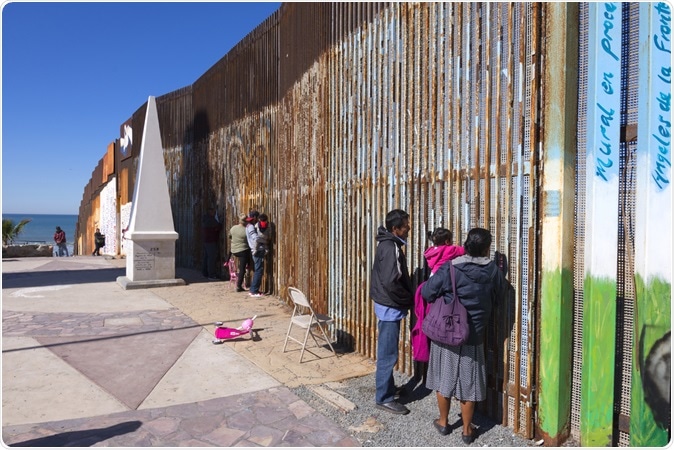
Separating migrant children from parents at US border tantamount to child abuse
Pediatricians and experts on child trauma are expressing deep concerns regarding the effects of separating migrant children from their parents at the United States borders and what this could bring about in the child as they grow.
Horror stories of children being separated from their parents at the US and Mexico borders are emerging with healthcare experts saying that this could cause long lasting physical and psychological damage to the children. They are asking for the children to be reunited with their parents as soon as possible to minimize the damage. According to the head of the American Academy of Pediatrics, this is “child abuse” and goes against everything that pediatricians stand for. Experts have expressed concerns not as politicians but as scientists.

Border wall in Playas de Tijuana. Image Credit: Chad Zuber / Shutterstock
The course of events started from Mid-April to May this year when the US Department of Homeland Security started separating nearly 2000 children from their parents after their parents crossed over the borders and entered US illegally. These adults were jailed under the new laws of “zero tolerance” for illegal immigration by the Trump administration. The children of these defaulting adults were then transferred to shelters that were run by the Office of Refugee Resettlement.
According to the figures at the end of May 2018 from the Department of Health and Human Services, these children are held at the facilities for an average of 57 days before they are reunited with their parents and deported back. However not all parents who were deported back could be reunited with their children and many of these children are still in the facilities separated from their parents.
Department of Homeland Security secretary Kirstjen Nielsen assures that these children are take good care of and are provided with healthy meals, education and medical care. Health care professionals however disagree that keeping the children sheltered and well fed is not enough to keep them safe psychologically. There are long term effects on their personalities and development in general, they explain, as a result of this forced separation from their parents.
According to experts, separation from parents and primary care givers can lead to immediate trauma and induce panic in both parents and the children. This leads to elevation of levels of stress hormones such as cortisol and adrenaline. They may develop a rapid heart rate and high blood pressure along with symptoms of stomach upset and headaches say experts. Experts believe that even the youngest of children would be affected by the separation negating assumptions that they are too young to remember.
After the initial shock of the separation wears off the children may stop crying but the underlying distress would remain and keep affecting the children psychologically while their stress levels remain high within. There is deep anxiety and depression that may not manifest outwardly. Over long term the duration of separation has an impact on the psychological well being of the child. There may be psychological conditions including post-traumatic stress disorder and separation anxiety among the child that may lead to anxiety disorders, panic disorders, depression, eating disorders, heart disease, diabetes etc. later in life. Impaired impulse control and delinquency is also a risk among these children in the long term.
A petition to President Donald Trump to stop this policy has been signed by around 7,700 mental-health professionals and 142 organizations. The petition says, “To pretend that separated children do not grow up with the shrapnel of this traumatic experience embedded in their minds is to disregard everything we know about child development, the brain, and trauma.”






















.png)









No hay comentarios:
Publicar un comentario